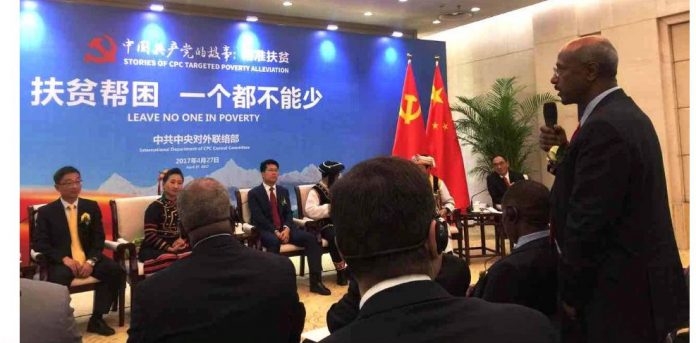BEIJING, Feb. 23 (DNA): Political parties from around the World have strongly reacted against some Western countries’ policy of interfering in other countries’ internal affairs under the pretext of human rights.
They opposed the policy while participating in an event, arranged here by the International Department of the CPC Central Committee (IDCPC) and the CPC Xinjiang Uygur Autonomous Regional
A total of over 310 leaders and prominent personages representing more than 190 political parties and organisations from 80 plus countries participated in an in-depth discussion on the theme of “A Better Life for All” and reached broad consensus.
All parties were of the view that it is the common goal and responsibility of political parties of all countries to work towards a better life for the overwhelming majority of the people.
They stressed that political parties of all countries should take the improvement of people’s wellbeing as their mission and strive to uplift the sense of fulfilment, happiness, and security thereof.
They have noted that COVID-19 has hit over 200 countries and regions, affected more than 7 billion people around the world and claimed over 2 million lives.
They urged all countries to continue to put the lives, safety and health of the people above everything else by deploying medical expertise and critical supplies to places where they are needed the most, saving lives with all might and main, and further promoting global joint epidemic response so that the pandemic is brought under control at an earliest possible date and the vision of building a global community of health for all appears on the horizon.
They noted that COVID-19 has plunged over 200 million people globally into extreme poverty and inflicted serious impact on the economic and social development of most countries, casting a dark shadow on the prospects of the United Nations 2030 Agenda for Sustainable Development.
They called on all countries to continue to strengthen coordination on macroeconomic policies, remain steadfast in maintaining the stability of the global financial market as well as that of industrial and supply chains, and to take measures to reduce debts and boost the flow of trade, so that the world economy could soon recover and grow, which will help bring global poverty reduction back on the right track as speedily as possible.
While subscribing to the protection and development of human rights, they pointed out that the right to subsistence and the right to development are principal and fundamental. Poverty constitutes the chief obstacle to the realisation of human rights.
They emphasised that the interests of the people should be placed in the paramount position and development should deliver greater benefit to the entire population in a more equitable manner.
They added, as there is no one-size-fits-all model to advance and protect human rights, the diversity in the path of human rights development should be respected and any attempt to politicise human rights, apply double standards thereof, or to interfere in the internal affairs of other countries under the pretext of human rights should be opposed.
They called for the concerted efforts of all countries to promote the establishment of a global governance architecture on human rights that is more equitable, just and inclusive.
They acknowledged that the Thematic Briefing has enabled them to acquire a comprehensive and in-depth understanding of China’s system of regional ethnic autonomy and the development of areas with large ethnic minority populations, including the actual situation in Xinjiang, where social stability as well as equality and unity among various ethnic groups prevail, people’s livelihood keeps improving and the economy develops constantly.
They expressed appreciation of what the Chinese government has done to promote economic and social development of areas with large ethnic minority populations, and to respect and protect the right of people of all ethnic groups to freedom of religious belief and to use their own spoken and written languages.
They firmly opposed the odious behaviour of a crumb of individuals from certain countries in misleading the international perception and smearing other countries with distorted and fabricated facts and disinformation of cooked-up rumours of so-called China’s “ethnic cleansing” in Xinjiang.
Extending their best wishes to the CPC and the Chinese people on the eve of the centenary of the CPC, they applaud the CPC for its commitment to the original aspiration and founding mission of seeking happiness for the people and rejuvenation for the nation, for its leadership under which the Chinese people have created the miracle of rapid economic development together with the miracle of long-term social stability, and most recently, the major achievements in both COVID response and economic and social development.
They commended the important help China has offered to the global fight against the virus, in particular the honouring of its commitment to make vaccines a global public good.
They expressed their willingness to strengthen exchanges and mutual learning with the CPC on governance experience, and to promote the deepening of mutually beneficial cooperation among countries towards the building of a community with a shared future for mankind.

















